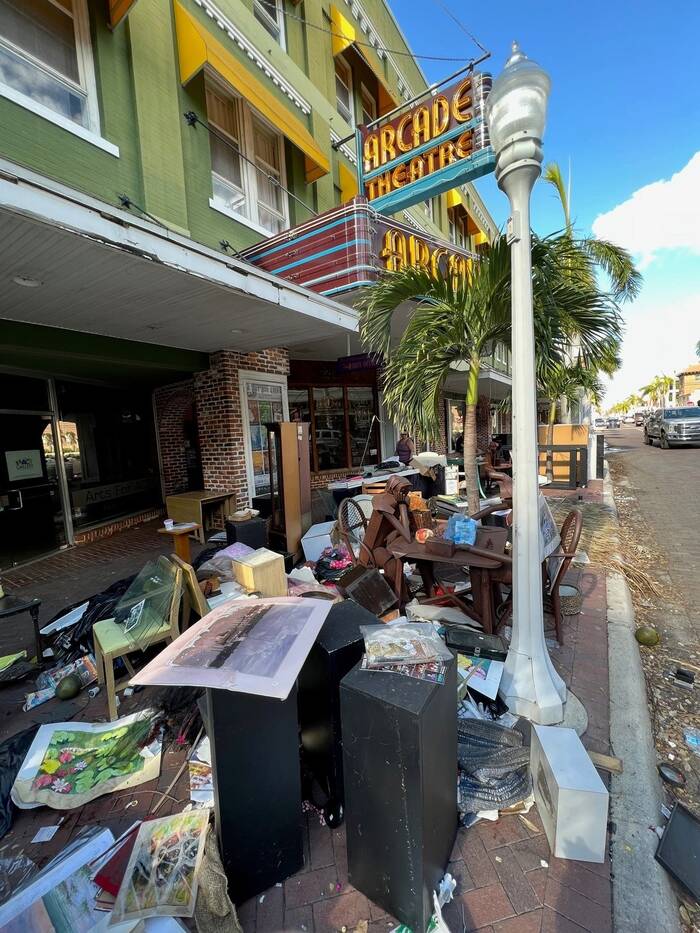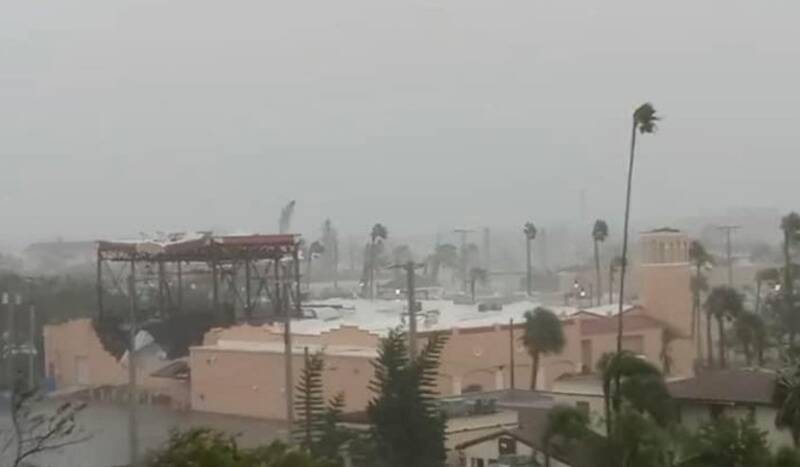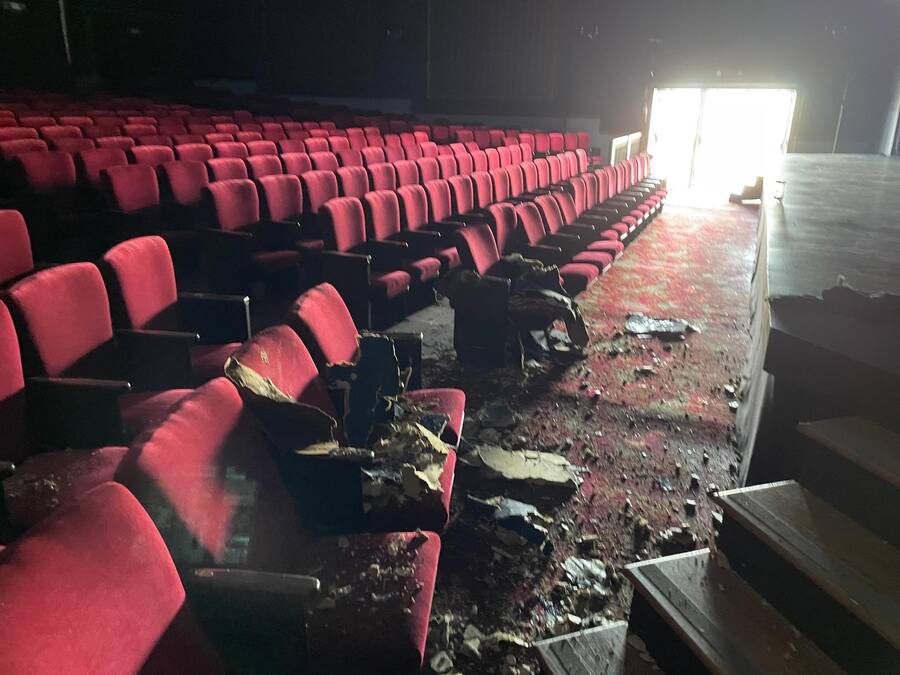The last weekend in September, Lady Day at Emerson’s Bar & Grill opened in the black box space inside Florida Repertory Theatre’s 100-year-old home in Fort Myers, despite warnings of a hurricane headed further up the west coast toward Tampa.
Ninety-six hours, a sudden right turn in Ian’s path, 115 mph winds and 6 to 28 feet of storm surge later, the show did not go on.
Part of the roof caved in on the 393-seat main auditorium of the Rep’s historic Arcade Theatre. The orchestra pit was under six feet of water, which nearly reached the edge of the seats. Three inches of thick black sludge covered the administrative offices, rehearsal halls, and storage areas.
Water rushing in from the adjacent Caloosahatchee River destroyed uncalculated amounts of lighting elements, costumes, props, and documents, even a private library of playscripts. Four-foot-high brownish water stains were found days later on the walls. Though performances at the theatre resumed this past week, the damage from Ian’s onslaught is still being accounted for.
“I joke with people as I give the curtain speeches before our performances,” said producing artistic director Greg Longenhagen. “I say it’s almost biblical. First we had plague, now we have flood. If the locusts show up, I’m leaving town.”
The venerable theatre wasn’t the only one to feel the wrath of Ian, one of the most devastating storms to smash Florida: 60 miles to the north, the walls surrounding the stage of the Venice Theatre collapsed and the fly loft was ripped open on the 72-year-old community theatre’s home. Thirty-five miles to the south in Naples, the Gulfshore Playhouse’s opulent new $40 million home, still under construction, lost one weakened concrete wall and may lose another.
At the Rep, the impact was immediate and devastating. “It comes in, it hits hard and fast, it leaves everyone with their mouth agape,” Longenhagen said of the storm during a break from applying for FEMA loans and other emergency grants.
On the other side of the balance sheet: the Rep’s resilient staff and committed performers, who refused to wait longer than to catch their artistic breath (after checking their own homes for damage) to help with repair and recovery efforts. They helped cut out several yards of ruined drywall and baseboards throughout the building; they flushed out floors; they piled ruined furniture, sewing machines, and debris on the sidewalk.
After 16 lost performances, representing about $60,000-$80,000 in income, what was salvageable of Lady Day was moved to the nearby Alliance for the Arts’ Foulds Theater, and the show went on there, even as the Rep staff was in the midst of a massive cleanup of a scope that none had seen before.

This past week, after the company had made the main auditorium livable enough for audiences, the company opened—on time—the ironically titled Incident at Our Lady of Perpetual Help. Rehearsals are underway for the upcoming And Then There Were None and Freud’s Last Session.
“They have let no dust grow under their feet,” quipped Michele Hylton-Terry, executive director of the Fort Myers City Community Redevelopment Agency, a major champion of the venue.
Clean-up will last for months. Insurance will not begin to cover a loss Longenhangen calculates will land in the range of $1-1.7 million.
When audiences return to the main auditorium, they may notice all the wood cut out under the apron. A portion of the ceiling has been patched and tarped. Rugs have been freshly drained and shampooed. A remediation company dehumidified the area, and refreshed it with a disinfectant to stop mold and curb the odor.
The damage is a profound blow for a professional company celebrating its 25th anniversary with two active performance spaces, as well as a lengthy list of education programs serving about 45,000 young people, from Shakespeare in the schools to summer camps. Its reputation for quality is solid, and not just in the community. The late Wall Street Journal critic Terry Teachout bestowed sterling reviews during annual visits year after year, contending that the Rep’s 2017 production of The House of Blue Leaves was “as good as it gets.”
Aside from the fiscal loss, the overwhelming worry is attracting people back into the theatre, Longenhagen said. “We haven’t sold many tickets since the storm hit, which is understandable,” he said. “A lot of people here are homeless. People are still living in shelters. We lost lives. We lost, sadly, one of our volunteers.” Marti Campbell, 74, had been an usher there for 16 years.
The potential effect on a demoralized, preoccupied audience’s return is the reason the Barbara B. Mann Performing Arts Hall eight miles away postponed the scheduled December visit of the national Hamilton tour. The building sustained some roof damage, but has already resumed one-night events. Attracting 1,500 patrons to a one-night stand seemed far more likely than trying to attract 30,000 people over 16-performance run.
The blow comes at a fraught time for the Rep, which, like hundreds of other theatres across the country, was already dealing with the fallout from the pandemic, including dark houses and staff cutbacks. Like so many medium-sized companies, the Rep operates on a very small margin, with little or no reserves past capital projects. Given a $4.3-million annual operating budget pre-pandemic, Longenhagen said, “We feel if we can be in the black just by a little tiny bit, then we’re jumping for joy. But arts organization these are very delicate institutions.”
The theatre’s fortunes also affect the community, which had seen the company as part of a major redevelopment. “It has been a vital part of the fabric of our downtown, bringing many visitors to go to the theatre, have dinner, shop,” said Hylton-Terry. At the height of tourist season, its shows bring 500 patrons for each of eight shows. The public agency, which paid the theatre’s rent until the company bought the building, sees the venue as “integral to our downtown’s success,” she said.

Still, the Rep’s home fared far better than the Venice Theatre 60 miles to the north, originally built in 1926. Rehearsals had begun for Kinky Boots, which was slated for November. But theatre’s north wall buckled open under 115-mph gust winds, allowing water to rush in and cover the stage, backstage, fly loft, and front of house. The walls surrounding the stage were ripped away, leaving only the skeleton of the steel structure. Early estimates place the damage at $4-$5 million. While Kinky Boots has been officially postponed a year, the Venice company is finding other venues to stage its A Christmas Carol the first week of December.
Gulfshore Playhouse, housed in a civic building in Naples for many years, canceled its first production of the season, 26 Miles, in part due to infrastructure challenges and city-wide damage. The apartment complex housing most of the actors was inundated with sea water.
Hurricanes are a fact of life for Florida theatres. The Rep had little trouble when Hurricane Charley swept nearby in 2004. When Hurricane Irma threatened in 2017, rehearsals and previews were postponed. Among the worst damage recorded for a Florida theatre occurred in 1992, when Hurricane Andrew struck Dade County. At the 300-seat Actors’ Playhouse in Kendall, the roof of the former movie house caved in, the box office was destroyed, and the lobby damaged. But two years later, the company bought another former movie house in downtown Coral Gables’ ritzy Miracle Mile.
Hurricanes are such a staple of Florida that they’ve turned up in such locally written works such as Nilo Cruz’s Hurricane and Christopher Demos-Brown’s Captiva. But perhaps the plays that come to mind given the recent devastation have been the likes of The Tempest and King Lear.
It’s a reminder, Longenhagen said, of “how small we are in the world, how tiny we really are when we come up against Mother Nature. I don’t care what you put up, I don’t care what kind of steel doors or whatever kind of hurricane shutters you may have. At the end of the day, we’re all vulnerable.”
Some second-guessing has occurred, though the staff did lay down sandbags ahead of the storm. “Some people can point the finger and say, ‘Well, you didn’t do this or you didn’t do that.’ But it really wouldn’t have mattered, because when Mother Nature comes roaring at your doorstep with a four-foot storm surge, she’s going to have her way.”
Contributions to Florida Rep can be made at https://tinyurl.com/2p9vcbdv. Contributions to the Venice Theatre can be made at www.venicetheatre.org/donate.
Bill Hirschman (he/him) is the editor and chief critic at Florida Theater On Stage. bill@floridatheateronstage.com


